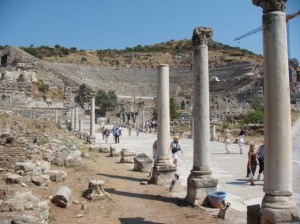
Stained glass window above the altar at Assumption Church in Chicago. The window depicts the Assumption of the Blessed Virgin Mary on the top and her Dormition on the bottom.
(c) 2012 The Catholic Counselor Lady
What is it about the Holy Days of Obligation?
In the Catholic Church there is what is known as Holy Days of Obligation. A lot of people really don’t like the word, obligation. The word conjures up images of having to do something against their own free will. Some might look at it as being another type of rule, piled onto so many other rules and commandments. But actually what they fail to realize is that while it is an obligation, it is also much more. It is about an opportunity. It is an opportunity to share in a celebration. It is an opportunity to obtain graces. It is an opportunity to receive Jesus. A Holy Day of Obligation is not a “don’t”— it is a “do.” This is a lot like the idea that the Commandments appear superficially to be life-limiting rules but in practice are life-giving and are quite liberating for the whole person and society. In fact, Holy Days of Obligation arise out of the Third Commandment which states, “Remember to keep holy the Lord’s Day.”
An opportunity to participate in the significant feasts of the Church
These Holy Days of Obligation correspond to significant feasts that honor the mysteries Our Lord, the Blessed Virgin Mary, and/or the saints. Every Sunday is actually a Holy Day of Obligation. The number and type of Holy Days vary according to the Catholic rite and nation. In addition to Sundays, there are six designated days in the Latin rite dioceses of the United States: The Solemnity of Mary, Mother of God; the Ascension; Assumption of the Blessed Virgin Mary; All Saints Day; Immaculate Conception; and Nativity of Our Lord Jesus Christ. If certain of these feasts happen to fall on a Monday or a Saturday, attendance at the Sunday Mass for that week is enough if designated as such by a the local bishop.
A Precept of the Church
These are actually the most important days of the year. They are obligatory in that all faithful Catholics are required to go to Mass according to the first Precept (Catechism of the Catholic Church, 2042). In other words they are an absolute minimum requirement and to intentionally violate would be considered grave matter or mortal sin. Of course, there are instances when persons might not be able to attend Mass in spite of their best intention. Such is in the case of sickness, caregiver responsibilities, difficulty with transportation, lack of access to a Mass, inability to leave from work or school, etc. These and other special circumstances for not attending an obligation would not be considered a mortal sin. But the faithful are required to put forth their best effort.
The Assumption of the Blessed Virgin Mary presents an opportunity
This Wednesday August 15 is the Solemnity of the Assumption of the Blessed Virgin Mary which is one of the Holy Days of Obligation. The Assumption celebrates the dogma of faith that Mary was “assumed” into Heaven. The word assumed means that her whole body and soul went up to Heaven to be with her Son, Jesus. The doctrine states that Mary’s body, born without Original Sin, was incorruptible and therefore taken directly to Heaven upon her death. In observing the Assumption we can appreciate the help of the Blessed Virgin Mary as the Mother of God as well as our Mother, and her cooperation in God’s will. It is also an opportunity for us to remember to take care of our own bodies and try to keep them holy as Temples of the Holy Spirit. August 15 has been connected to the Blessed Virgin Mary since the early centuries of the Church.
The House of Mary is located in Ephesus, Turkey. My family and I had the opportunity to visit this Shrine a couple of years ago. By tradition this is the location where St. John took Mary, the Mother of Jesus, to live out her last days on this earth before her death. Several Popes have visited this location which sits on top of a hill overlooking the sea. Incidentally, this is a place where both Christians and Muslims go to pray. Muslims also have devotion to the Blessed Virgin Mary as being the Mother of one of their great prophets.
So this week, if you are Catholic you have an obligation to go to Mass. However don’t forget that it is also an opportunity. If you are not Catholic, you are also welcome to attend. Before I was Catholic, I remember being in the company of those who had to cancel a breakfast meeting due to their “obligation.” However, I was never told what this meant and did not receive an invitation. Now that I am Catholic, I want to share this opportunity and to invite all interested. Local parishes usually have many Mass times and opportunities.


Pingback: Feast of The Assumption « A Simple, Village Undertaker